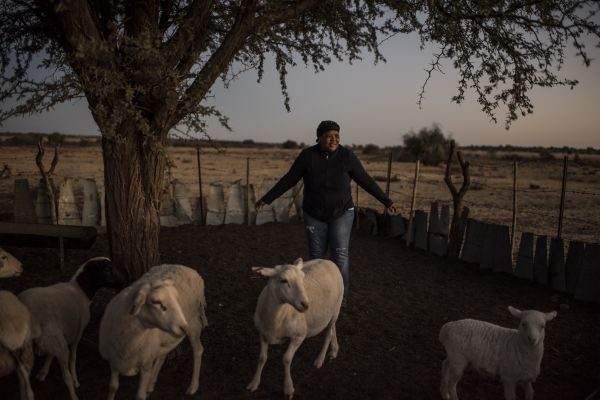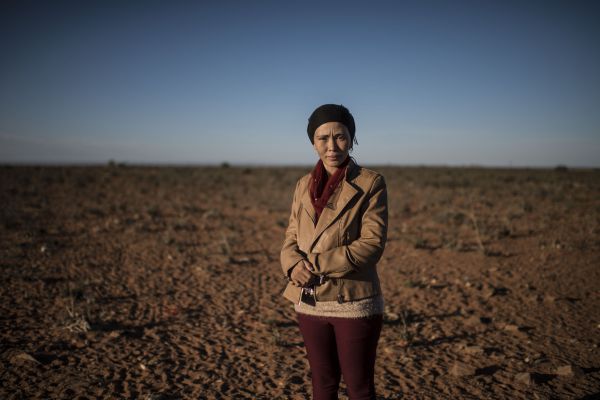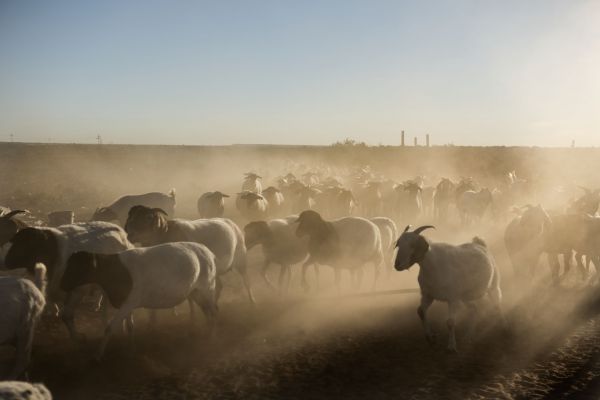Ipeleng Makae grows vegetables in her yard
Read the Mail & Guardian’s full coverage of the constitutional amendment hearings here.
Dressed in 7cm-high lace-up boots, faux-leather tights and flashing a gold-tooth-capped smile, Ipeleng Makae would hardly be considered a poster child for farming. But her girl-about-town image is a deceptive one.
In a car park outside the Kimberley City Hall, the 35-year-old is applying make-up as she prepares to make an oral submission to the joint constitutional review committee on whether section 25 of the Constitution should be amended to allow for the expropriation of land “in the public interest without compensation”.
The Kimberley hearings — the final leg in the Northern Cape’s hearings after those in Concordia, Upington and Kuruman — form part of national hearings on section 25, which addresses property ownership. Earlier this year, the National Assembly and the National Council of Provinces mandated the committee to review this section. More than 700 000 written representations on land expropriation were submitted by the public.
‘Change this thing’
Makae’s argument is simple: “Anything written by a person can be changed by a person. So, for me, I want this thing changed.”
Introduced to farming by her grandfather and father, Makae says she “grew up with it; with that passion for farming”.
Seeing the unemployment around her in Kamden, about 50km from Kuruman, the married mother of three began farming on her own in 2014 “so that I can put something on the table at my place for my family”.
Unable to afford a decent-sized piece of land, Makae farms in her back yard. “It’s small-small; not so big. But we can do something on it,” she says of the area on which she grows spinach, onion and beetroot.
She uses her yield in her catering business, supplies vegetables to schools and Kamden’s resi-
dents pay “R10 a bunch of spinach”.
But it is her frustration about not being able to expand her business that has brought her to Kimberley to address the committee.
“We have a lot of issues,” she says of small-scale farmers. “We don’t have our own farm so we can’t go to the bank and ask for a loan to start a business. So, for me, this thing [section 25] must be amended.
“You know,” she says, pauses and adds: “No, I don’t want to say this, so let me keep quiet.”
Then, changing her mind, she continues: “The whites, nè, the whites take our belongings. They took this land from our grandfathers, so it is a very big problem for us, because we can’t do anything. Can’t even get a loan from a bank. When you don’t have land, you have nothing. When you have land, you have something. You can do anything there.
“This continent is Africa. We are African. The African people must have it.”
‘Expropriation will be chaos’
Makae was one of 12 women who were part of Kedinametse Maluleke’s goats project, which aims to assist young women to become successful farmers.
Driving from the Thabiso Moorosi Centre — where the Kuruman leg of the hearings took place — to her communal farm in Kamden, 46-year-old Maluleke says she has been farming since her mid-20s.
Like Makae, Maluleke was introduced to farming by her grandfather and father. “My father had cattle and goats and we used to help him after school and during school holidays. I really enjoyed it as a child. I loved milking the cows.”

Kedinametse Maluleke (above) and Aysha Samiullah (below) don’t support the expropriation of land without compensation. Maluleke says politicians are driving it for their own purposes and Samiullah says taking land that may be someone’s birthright is wrong. (Paul Botes/M&G)

It was after finishing her matric and having “nothing to do” that she turned this love into feeding her family.
“I have to pay school fees but I don’t have R20 000 to pay, so I have to go to the cattle. Every time I need money, I go to the cattle. The cattle, the goats, they help us,” she says.
Establishing the goats project, she says, was a way of empowering young women in the area. “We were just housewives, so we were just at home not doing anything. [But with farming] we could make a living.”

Ipeleng Makae was one of 12 women who worked on a goats project that aimed to support women farmers but failed because of a lack of funds. (Paul Botes/M&G)
Despite the project no longer being in existence — largely because of a lack of funding — Maluleke says she is pleased that four of the project’s 12 women are still farming. “The others,” she says, “are working at the mines or for government.”
The decision of the majority of these women to jump ship for more stable jobs should come as little surprise, given the difficulties they face — not least of which is the drought in the province, now in its fourth year.
The tiny reservoir near the farm’s entrance is a little more than a quarter of its total capacity.
“During August, September, October, we struggle. The water goes down. So every day we have to take the bakkie and drive about 30km to get 50 litres of water to give to the cattle.
“But still they become thin because they are not eating well,” Maluleke adds, referring to the problem of overgrazing. This, she says, is as a result of “other farmers having the cattle graze on the land. We’ve tried speaking to the authorities about this but nothing is being done. We need more land.”
Desperate as she may be for more land, Maluleke does not want it to come through land expropriation without compensation.
“I’ve got a fear of what happened in Zimbabwe. I condemn this thing of pushing people out without compensation. I rather say, ‘put some land restitution measures in place’. [Expropriation] will be difficult and there will be chaos. This thing is just for the politicians. Poor people like us who are down, down, down, we will not benefit,” she says.
Taking land ‘is ’n ander ding’
The eight years spent farming in the Northern Cape’s harsh sun has yet to show on 28-year-old Aysha Samiullah’s face. A communal farmer on a two-hectare piece of land about 200km from Upington, Samiullah says the shortage of land is her biggest difficulty.
“Ons het meer grond nodig. Jy kan nie voortgaan met jou boerdery nie. Jy kan nie vorentoe gaan nie. Die diere is te veel vir die grond waarop jy boer [We need more land. You can’t continue with your farming. You can’t move forward. The animals are too many for the land that you farm on],” she says.
Like Maluleke, the possibility of getting this much-yearned-for land by expropriation does not sit well with her.
“Dis ’n ander ding, daai. Om iemand te ontein van die grond wat miskien van sy voorouers is en hy kry nie betaling vir dit nie. Dis mos nie goed nie [It’s another thing, that. To take away someone’s birthright that perhaps comes from his forefathers and he doesn’t get paid for it. That is not good],” she says.
Samiullah sticks to her passion despite the problems of overgrazing, drought and not being taken seriously as a young women farmer.
“As ’n vrou, hulle voel net vroue is nie daartoe in staat om te kan boer nie. Net slegs die manne. En as ’n jong vrou is dit baie moeilik om self te boer. Jy moet daardie challenges net accept [As a woman, they believe that women are not able to farm. Only the men. And as a young woman it is very difficult to farm yourself. You just have to accept those challenges],” she says.
‘Dish out land to women first’
In a June 15 opinion piece for the Mail & Guardian, Fatima Shabodien, director of South Africa Action Aid, wrote: “If land reform has a chance of success then women, but specifically black women, must be at the centre of land reform. This is, after all, the biggest demographic.”
Concurring with this sentiment at the Kimberley City Hall, 19-year-old Barkly West resident Motshabi Segopolo made an impassioned oral presentation calling for expropriation without compensation — and for women to be the first to benefit from it.
“We are tired of seeing sisters sell their souls and bodies just so they can feed their families. We are tired of seeing our mothers wake up every single day at 4am, to clean up after madam Helen and baas Jan, running after their ungrateful brats that call us the k-word,” Segopolo said, to rapturous applause.
“Women must be first in line when dishing out land. Because the time for land to be returned is now and the time for women to lead is now,” she said, adding: “How dare you whites come here and threaten violence? But your threats do not scare us. Asijiki.”
‘Expropriate – it’s our land’
For years, Gloria Petersen’s mother begged the farmer who owns the land where Petersen’s grandfather is buried for access to the grave.
After decades of pleading, Petersen and her mother were one day allowed on to the farm in Sydney on Vaal, about 30km from Barkly West. But, Petersen says, “when we went there, we were escorted by a security guard — like we were criminals”.
Years after eventually putting up a gravestone, Petersen wants more than just occasional visits. She wants the land where her grandfather is buried to be in community hands. Part of her vision is to use a section of the land to upgrade young women’s farming skills.
Petersen is a member of a community property association, which put in a land claim “years ago”. But because the claim has yielded no results, Petersen has made her way to the Kimberley hearings to tell the committee why she believes the Constitution should be amended.
Remembering her and her mother’s “years of begging and begging”, Petersen says: “I’m angry.”
Asked to explain this anger, she pauses and then says: “Just put yourself in my position. How can you even ask that?”
‘More or small, we need to farm’
Checking her reflection in a car window one more time before stepping into the Kimberley City Hall to try to convince the committee that the Constitution “written by people” should be changed, Makae says that, whether or not this happens — and she does or doesn’t get her hands on a bigger piece of land — she is determined to pass her love for farming on that “small-small” piece of land to another woman — her daughter.
Not an easy task, she concedes. “She doesn’t like it, this farming thing,” she laughs. “But I tell her: ‘You must like this thing; this thing is what gives you food on the table and helps me pay your school fees.’ I tell her: ‘You must do these things because at the end of the day, the job that you are going to be looking for, you’re supposed to produce a certificate from a university or what-what. But when you have farming, there’s nothing that you need to produce to someone to give you a job. So you, you must like this thing.’ ”
Carl Collison is the Other Foundation’s Rainbow Fellow at the M&G